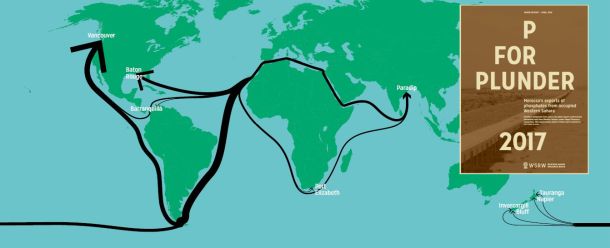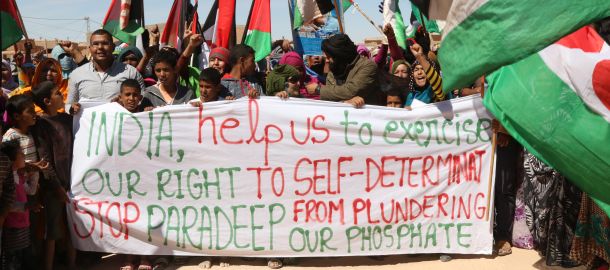
The two letters below were sent to the firms Nidera Uruguaya and ISUSA on 21 June 2010, as a follow-up of the WSRW revelations earlier this year.
See also coverage in the Uruguayan newspaper La República.
Nidera Uruguaya S.A.
Att: Chief Executive Officer
Rambla 25 de Agosto de 1825 n° 440
CP 11000 Montevideo
Uruguay
Brussels
21 June 2010
Regarding Nidera’s possible phosphate purchases from occupied Western Sahara
Dear Sir,
We are writing to you today about vessels of phosphates from occupied Western Sahara that have arrived in Montevideo harbour, Uruguay. Our sources say that one of the 2 importing companies in Uruguay is Nidera Uruguaya SA.
We would like to pose a few questions about this trade, and inform you that such purchases from occupied Western Sahara is politically controversial, highly unethical and potentially against international law.
Most of Western Sahara is occupied by Morocco since 1975. However, to this day, no state or international organization recognizes Morocco’s sovereignty over Western Sahara. The United Nations have repeatedly stated that this illegal occupation must end and that the Saharawi population has to be allowed to freely exercise their right to self-determination through a free, fair and transparent referendum.
The occupation of Western Sahara has resulted in enormous suffering and deprivation for the Saharawi people, who are the rightful owners of the land and the natural resources. Approximately 165,000 Saharawi are languishing in refugee camps in the inhospitable Algerian desert since 1975, where they have to survive on humanitarian aid paid for by the international community. The Saharawi population remaining in areas under Moroccan control is subjected to grave human rights violations, such as torture, forced disappearances and arbitrary detention.
The UN has established that Morocco has not right to extract and sell Western Sahara’s resources, if carried out in the manner it is today.
Firms that import phosphates from Western Sahara thus contribute in supporting the continuation of the illegal occupation and contribute to undermining the UN peace process. Money from phosphate extraction and trade goes directly to OCP, the Moroccan state-owned company located in Western Sahara. This kind of support makes Morocco less inclined to contribute to finding a solution to the occupation, and makes delaying tactics and attempting to profit from the existing situation more attractive. The phosphate trade in Western Sahara therefore increases the risk of further armed conflict, destabilization and suffering in the region.
Morocco’s control and exploitation of Western Sahara also hurts the Saharawi’s labour rights and their economic development. According to a report by the French organization France Libertés - Fondation Danielle Mitterrand, the Saharawi have been systematically marginalized from the phosphate industry in Western Sahara. In 1968, before Morocco took control over the phosphate mines, all 1600 workers in the industry were Saharawi. Today, 1800 of 2000 workers are Moroccan settlers who have illegally been moved into the territory.
Businesses around the world have realized their ethical obligations and have stopped importing natural resources from occupied Western Sahara. For example, Yara, the world's biggest fertilizer company, terminated the imports to Norway in 2005, for ethical reasons.
In addition to ethical concerns, the companies involved in this trade should be aware that the trade is most probably in violation of international law.
The International Court of Justice in its 1975 Western Sahara Advisory Opinion established that Morocco has no legal claim to Western Sahara. That same opinion affirmed that the Saharawi population has a right to self-determination, which includes, inter alia, the right of permanent sovereignty over its natural resources. Permanent sovereignty over natural resources is a customary principle of international law. Numerous resolutions of the United Nations Security Council and General Assembly and a legal opinion by the former UN Under-Secretary General of Legal Affairs, on 29 January 2002 affirm this position. Because the Saharawi have not been able to exercise their right to self-determination, and because they have not been properly consulted, trade with Morocco of natural resources emanating from Western Sahara is a violation of the Saharawi’s right to permanent sovereignty over their resources.
It appears to us that on one occasion last year, Nidera Uruguaya received phosphates from the occupied territory. The imports were done by the vessel ‘Katina’, on 12 November 2009, supposedly containing 5500 tonnes of phosphate rock.
We would like a clarification from your firm regarding the following questions:
- when the contract with the Moroccan producer OCP was signed;
- when the contract with OCP expires; and
- how much phosphates are covered by the agreement.
If Nidera Uruguaya confirms to have a contractual arrangement with OCP covering phosphates from Western Sahara, we urge your firm to demonstrate your attachment to international legality, human rights and basic standards of corporate social responsibility by reconsidering your involvement.
Western Sahara Resource Watch urges Nidera to issue a statement that your company intends to no longer import phosphates from occupied Western Sahara and terminate the current contracts you might have with OCP.
We will be more than happy to provide you with any additional information that you may require to study this matter more closely, and look forward to a reply to our questions.
Yours sincerely,
Sara Eyckmans
Coordinator
Western Sahara Resource Watch
www.wsrw.org
Frank Willems
Coordinator
Stichting Zelfbeschikking West-Sahara
www.west-sahara.nl
Copy of this mail sent to: CEO of Nidera, Mr. Ito van Lanschot.
President of ISUSA,
Sr. Ingeniero Químico Oscar Rufener,
Industria Sulfúrica Sociedad Anónima
Ruta 1 Km 24 s/n
San José
Uruguay
Brussels
21 June 2010
Regarding ISUSA’s possible phosphate purchases from occupied Western Sahara
Dear Mr. Rufener, president of ISUSA,
We are writing to you today about vessels of phosphates from occupied Western Sahara that have arrived Uruguay. Our sources say that one of the 2 importing companies in Uruguay is ISUSA.
We would like to pose a few questions about this trade, and inform you that such purchases from occupied Western Sahara is politically controversial, highly unethical and potentially against international law.
Most of Western Sahara is occupied by Morocco since 1975. However, to this day, no state or international organization recognizes Morocco’s sovereignty over Western Sahara. The United Nations have repeatedly stated that this illegal occupation must end and that the Saharawi population has to be allowed to freely exercise their right to self-determination through a free, fair and transparent referendum.
The occupation of Western Sahara has resulted in enormous suffering and deprivation for the Saharawi people, the rightful owners of the land and the natural resources of Western Sahara.
Approximately 165,000 Saharawi are languishing in refugee camps in the inhospitable Algerian desert since 1975. The Saharawi population remaining in areas under Moroccan control is subjected to grave human rights violations, such as torture, forced disappearances and arbitrary detention.
The UN has established that Morocco has not right to extract and sell Western Sahara’s resources, if carried out in the manner it is today.
Firms that import phosphates from Western Sahara thus contribute in supporting the continuation of the illegal occupation and contribute to undermining the UN peace process. Money from phosphate extraction and trade goes directly to OCP, the Moroccan state-owned company located in Western Sahara. This kind of support makes Morocco less inclined to contribute to finding a solution to the occupation, and makes delaying tactics and attempting to profit from the existing situation more attractive. The phosphate trade in Western Sahara therefore increases the risk of further armed conflict, destabilization and suffering in the region.
Morocco’s control and exploitation of Western Sahara also hurts the Saharawi’s labour rights and their economic development. According to a report by the French organization France Libertés - Fondation Danielle Mitterrand, the Saharawi have been systematically marginalized from the phosphate industry in Western Sahara. In 1968, before Morocco took control over the phosphate mines, all 1600 workers in the industry were Saharawi. Today, 1800 of 2000 workers are Moroccan settlers who have illegally been moved into the territory.
Businesses around the world have realized their ethical obligations and have stopped importing natural resources from occupied Western Sahara. For example, Yara, the world's biggest fertilizer company, terminated the imports to Norway in 2005, for ethical reasons.
In addition to ethical concerns, the companies involved in this trade should be aware that the trade is most probably in violation of international law.
The International Court of Justice in its 1975 Western Sahara Advisory Opinion established that Morocco has no legal claim to Western Sahara. That same opinion affirmed that the Saharawi population has a right to self-determination, which includes, inter alia, the right of permanent sovereignty over its natural resources. Permanent sovereignty over natural resources is a customary principle of international law. Numerous resolutions of the United Nations Security Council and General Assembly and a legal opinion by the former UN Under-Secretary General of Legal Affairs, on 29 January 2002 affirm this position. Because the Saharawi have not been able to exercise their right to self-determination, and because they have not been properly consulted, trade with Morocco of natural resources emanating from Western Sahara is a violation of the Saharawi’s right to permanent sovereignty over their resources.
It appears to us that on 2 occasions last year, ISUSA received phosphate from the occupied territory. The first arrived Montevideo, on the vessel ‘Myra’, on 10 July 2009, containing 16.500 tonnes of phosphate rock. The other arrived on ‘Federal Pioneer’, containing 16.170 tonnes of phosphate rock. In total, the two shipments had a value of 3,7 million US dollars.
We would like a clarification from your firm the following questions:
- when the contract with the Moroccan producer OCP was signed;
- when the contract with OCP expires; and
- how much phosphates are covered by the agreement.
If ISUSA confirms to have a contractual arrangement with OCP covering phosphates from Western Sahara, we urge your firm to demonstrate your attachment to international legality, human rights and basic standards of corporate social responsibility by reconsidering your involvement.
Western Sahara Resource Watch urges ISUSA to issue a statement that your company intends to no longer import phosphates from occupied Western Sahara and terminate the current contracts you might have with OCP.
We will be more than happy to provide you with any additional information that you may require to study this matter more closely, and look forward to a reply to our questions.
Yours sincerely,
Sara Eyckmans,
Coordinator,
Western Sahara Resource Watch
Copy sent to:
Minister of Foreign Affairs of Uruguay, Mr. Emb. Luis Leonardo ALMAGRO LEMES
New report: Western Sahara phosphate trade halved
The export of phosphate rock from occupied Western Sahara has never been lower than in 2019. This is revealed in the new WSRW report P for Plunder, published today.
New report on Western Sahara phosphate industry out now
Morocco shipped 1.93 million tonnes of phosphate out of occupied Western Sahara in 2018, worth an estimated $164 million, new report shows. Here is all you need to know about the volume, values, vessels and clients.
New report on contentious Western Sahara phosphate trade
Morocco shipped over 1.5 million tonnes of phosphate out of occupied Western Sahara in 2017, to the tune of over $142 million. But the number of international importers of the contentious conflict mineral is waning, WSRW's annual report shows.
New report on global phosphate trade from occupied Western Sahara
Over 200 million dollars worth of phosphate rock was shipped out of occupied Western Sahara last year, a new report from WSRW shows. For the first time, India is among the top importers.



